#fellas is it romantic to want the protagonist to want to kill you
Text
enjoying zenos is so difficult bc one moment youre watching him and hes just completely normal subjectively pretty and then the next hes saying some incredibly out of pocket shit and pulling the bsd fisheye lens face and all you can do is pray that your friends dont see it because of the "this ur man 🤨" comments
#i say subjectively pretty bc i have horrible taste in men and cannot view him objectively#i have a screenshot in my folder from the scene where fandaniel is like 'were going to the moon'#& hes just standing there eyes closed AND HE LOOKS PRETTY#somehow. sOMEHOW. ilberd's creepy expressions were worse#again maybe im just biased i can cope with some random weird faces#also because i watched hannibal at a young age i cant see half the shit he says as actually creepy. no ur honor its just romance#i will never stop drawing parallels between zenos & hannibal (2013) i refuse and you all should be GLAD i dont know how to gif#fellas is it romantic to want the protagonist to want to kill you#hannibal's 'how would you [kill me]' 'with my hands' actually insane they are my lead inspiration in my zenos/wol bullshit#bro i could talk about this parallel for fucking hours#person who has only hannibal as reference for fictional relationships looking at enemies: is this romance#also sorry for the bsd reference idk how many of u watch bsd but it was the easiest way to describe it
8 notes
·
View notes
Text
Okay @princekirijo you want an essay? Well here it is now, or as I like to call it Felix's "Asumari is great and this fandom has no fucking taste" rambling and infodump. Congrats fellas, thanks to Prince you ALL get an asumari essay. But before that I'll try to give you a rundown of Mari and Asuka.
(I'm also so sorry for putting this long ass post on everyone's dashboard)
(Spoiler warning for Evangelion 3.0+1.0 Thrice Upon a Time!!)
Alright on one hand we have Mari Illustrious Makinami. Her whole deal? She's a walking ray of sunshine, literally lol. Unlike any other character in the Evangelion franchise she doesn't suffer from her trauma, she's quite literally the only healthy and functioning human being, she's just slightly leaning towards "batshit crazy" with the stunts she pulls 🤷♂️. Other than that she just loves living, she loves being with people, she keeps moving forward, stays positive and decides to live life to it's fullest even after she experiences loss and multiple apocalyptic events (Second Impact, Third Impact, etc.) and she really just embodies the joy of living. That's all there is to her, or at least all we know.
On the other hand, we have Asuka Langley Shikinami who is... well it's hard to explain what she is to be honest. She's part-German and part-Japanese and part of a line of clones specifically made with the purpose to pilot an Evangelion and later on be used as a sacrifice to trigger another Impact (ITS COMPLICATED I KNOW-) Asuka is, unlike Mari, very much suffering from her trauma. She doesn't have her parents and has a very deep seated belief that she's completely alone, which she says doesn't matter as long as she can pilot the Eva. She also very much wants to fight and kill angels all by herself, and it's seriously messing with her when she can't achieve that.
Now we get to the more interesting parts (hopefully this so far wasn't too confusing, then again it's Eva and even I can't fully wrap my head around it all LMAO)
In the second Rebuild movie (Evangelion 2.0 You can (not) advance) we get introduced to both of them, Mari's introduction scene (in the original English dub) has her pilot an Eva and singing about how she'll take the world on by herself, while in the third movie's (Evangelion 3.0 You can (not) redo) opening scene she's piloting the Eva again but this time it's together with Asuka (in her own Unit 02 though) and during that Mari sings about how wonderful it is not to be alone. It's nothing big yet, but it's a really cute detail me thinks,,, you know what else I love about them? They bicker and they banter and it's genuinely so fun to listen to shskdhsuwj
(For a quick catch up: During the end of 2.0 Shinji (the protagonist) triggers another apocalyptic event, the Near Third Impact, and was only stopped due to Kaworu (the guy in my pfp) stepping in. Also between 1.0/2.0 and 3.0/3.0+1.0 are about 14 years (without Shinji bc he's like comatose) where A LOT happens AND we learn in 3.0 that Eva pilots don't age physically bc of "The curse of the Eva"... honestly Eva is wild lmao)
Okay okay I'll get back to it!
So one thing that happens is that Asuka during 2.0 develops a crush on Shinji (girl why-), unfortunately things take a turn for the worse. Asuka had volunteered to be the testpilot for a new Eva (Unit 03), she seemed happy at the time and it was a really sweet build up with the "I can smile, I didn't know I could still do that."-line. And then? Then it turns out the Ninth Angel had infected Unit 03 (Angels are basically the Kaijus they fight using Evas btw). The thing goes on a loose and Shinji is forced to fight it (With Asuka inside mind you), he refuses and his father uses an autopilot to destroy Unit 03. And boy did it destroy the angel, well it and it crushed Asuka between its jaws (you can actually hear her scream btw haha pain :)).
Asuka survived though, but the whole incident cost her her humanity and she ended up becoming an angel herself/she took the place of the Ninth. But despite that, there's one person who keeps believing in Asuka's humanity, who fiercely believes Asuka is still a human and tells her as much.
Yep, that one person is Mari and she keeps holding onto that belief until the very end when Asuka uses her last resort, which is using the power of an angel (Doing so was a guaranteed death sentence btw). Mari's own words (in the German dub) were, "Princess, you're giving up being human…" AND IT MAKES ME SO EMO GOD FUCK
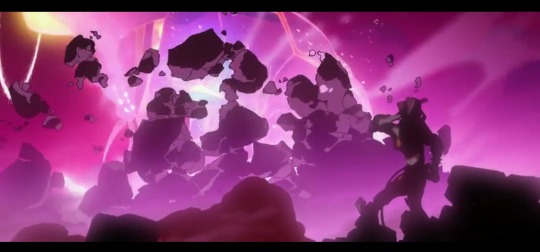
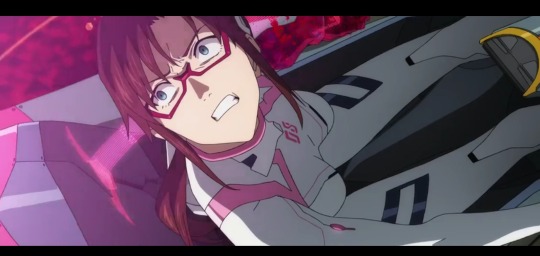
While I'm at it, Mari and Asuka are a fucking killer combo as a team. They rely on each other for support in combat, listen to the other's orders and advice. Especially in Asuka's case it's kind of a big deal that she so openly relies and counts on Mari's support. Like these two trust each other with their damn lifes!!! Holy shit!!
Guess what though, they also have nicknames for eachother. Mari always calls Asuka "Princess" or "(Your) Highness" while Asuka calles Mari "Four-eyes" / "Four-eyed chrony (idk how you spell that tbh RIP" Even better though, in the German dub Asuka calls Mari "Brillerella" as in a combination of "Brille" (German for glasses) and "Cinderella",,,,Cinderella and her Prince,,,Brillerella and her Princess,,, man, that was a gay fucking move of the translation team. Spoiler: I owe them my life.
Funfact: There's exactly two times throughout the Rebuild movies where Mari uses Asuka's actual name. These two times being when she watches Asuka "die" and be used as a sacrifice for Gendo's selfish plan and when later on she begs Shinji, "So please the Princess… Asuka needs your help!" And the best part? That wasn't even the first time she did that. The mentioned line came from 3.0+1.0, but she did that too in 3.0 with the, "At least save the Princess!" line (although her tone was much more...pissed, like she was really angry lol)
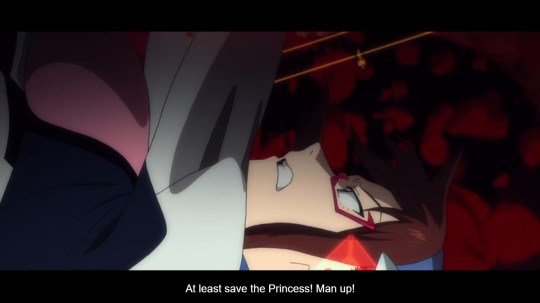
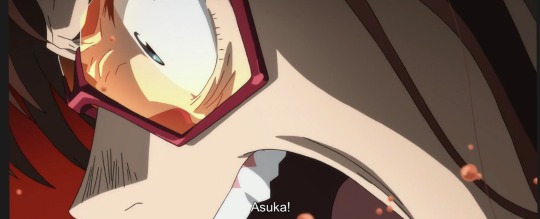
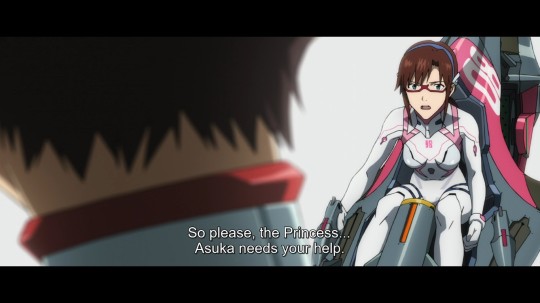
Remember the crush Asuka had on Shinji? Well due to the Unit 03 incident a whole lot of other shit got mixed into that and her feelings for him in general became really bitter (understandably so). Now Mari being who she is sometimes teases Asuka about said old crush but she really does want Asuka to get closure and sort that mess out.
As an example for the teasing, in 3.0 there's a scene that goes like this (please imagine Mari with a literal :3 face while saying that):
"Unit! Are you back in the game?"
"I'm on it, your Highness. But first things first, how was our little puppy (Shinji)? Did he sit like a good little boy?"
"He's exactly the same! Same stupid face talking mayhem!"
"That goofy face of his, that's what you wanted to see? Riiiiight?"
"Shut up! I went there to bat him one!... And I feel better!"
There's also a very short bonus manga that was released in Japan for Thrice Upon a Time's release that has Mari trying to convince Asuka to come with her on the mission to get Shinji, given everything that follows, it's just another thing to prove my point. And the final bit relating to that is this:
"Feeling better now?"
"Yeah, I do feel better."
That's the exchange Asuka and Mari have after they talked to Shinji, it's nothing special but I think it's really sweet and this time Asuka actually sounded like she was feeling better instead of when she was screaming after she nearly broke pretty thick glass with her fist (If she had hit someone with that much force she definitely would've broken something omggg #violentimpulsesgang)
To get back on track though: I already mentioned it but during the second half of 3.0+1.0 Asuka "dies" (and honestly that entire scene is worth its own in-depth post because its just one huge parallel to The End of Evangelion), the point is: You can tell that the loss of Asuka honestly hits Mari hard. Not only because of how Mari screams Asuka's name but also because of her expressions. They're pained, like really fucking pained and Mari even apologizes to her that she has to fall back due to the fact that she's injured AND because eveything is going wrong.
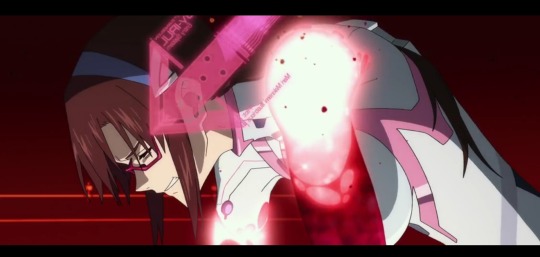
After the events of Evangelion 3.0 these two got seperated from eachother, Mari was with WILLE (the organization both of them are with) and on board of Wunder (the ship WILLE basically operates from) while Asuka was in a Village full of (Near) Third Impact Survivors. When they do meet again it went like this:
Asuka, barely back, comes to the door and calls, "I'm back." And within seconds of Asuka stepping into their room after the door opens Mari already runs towards her, arms wide open and she says, "Welcome back, your Highness! Good job. I missed you so much!" And she says that while she literally nuzzles into Asuka,,,like,,,what the fuck gay people real!!!
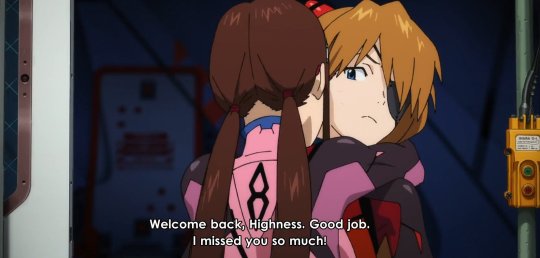
Best part? Asuka clearly has enough strength to push Mari completely away if she were uncomfortable, but she doesn't. Asuka merely wanted enough space to look at the room (because Mari managed to horde even more books lol) and play her game. During their entire renunion Mari keeps hugging her, and part of me thinks that perhaps deep down Asuka actually enjoys the feeling of physical affection.
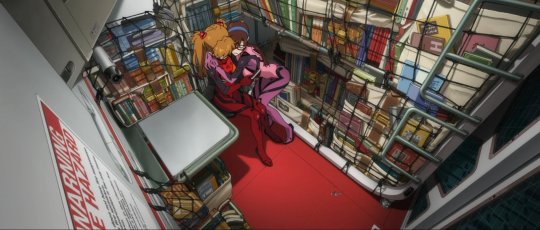
Before we get to the last point though, let me say that Asuka and Mari have scenes in 3.0+1.0 that parallel Shinji and Kaworu's from 3.0. (Fyi Kaworu loves Shinji (yeah, like that, and 3.0 was basically them being gay as fuck for an hour) so like...do I even need to explain?
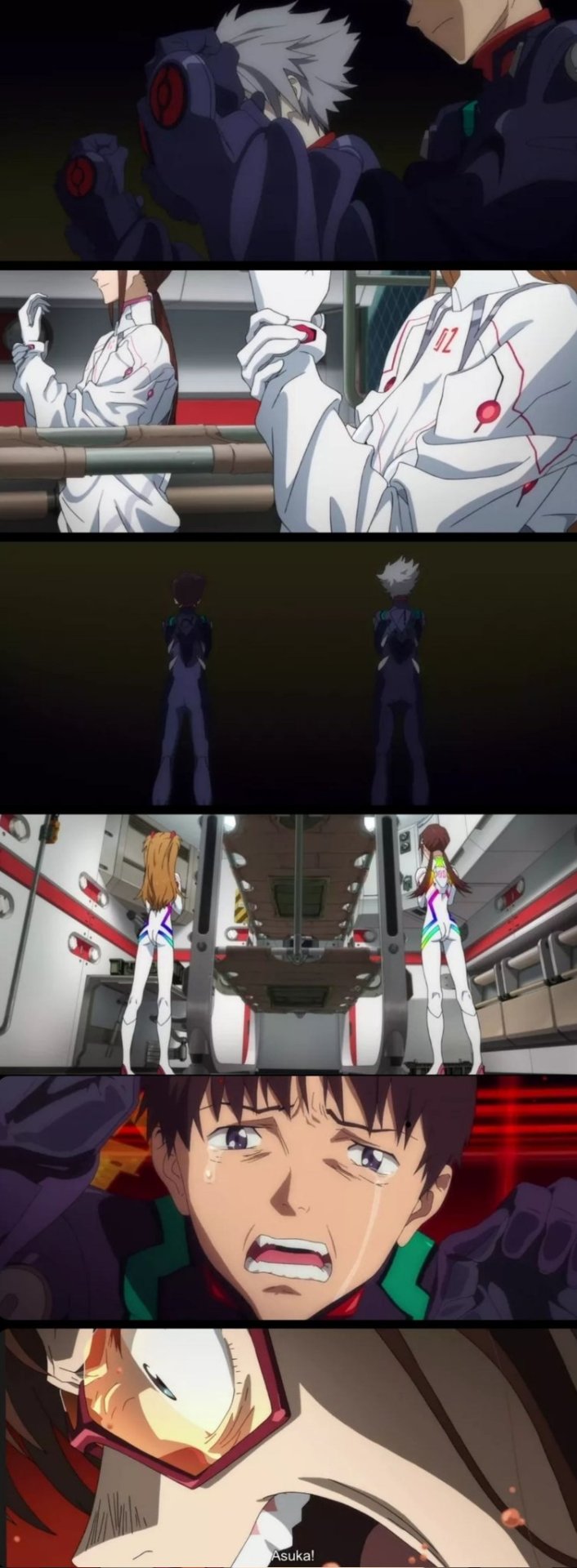
And then of course there's also this, the "Take care of yourself, Princess…" line. That is the last time Mari talks to Asuka and as much as that line alone already is so much, it's Mari's expression in particular that kills me. Because this? This soft, almost bittersweet expression she has, as she basically says goodbye? Because she knows Asuka will finally be happy and safe? It just makes me feel so much actually. Man.
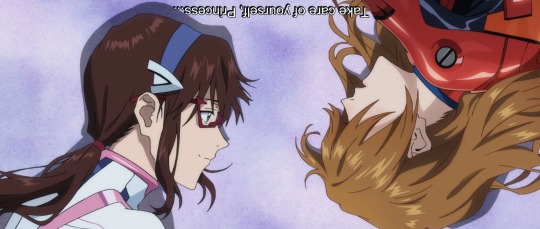
In the end it's a fact that Mari loved Asuka, wether that is interpreted as platonic or romantic by someone is up to them. But it is a fact that Asuka was loved enough that someone wanted to hug her, was happy to see her, to praise her, was hurt by her loss, wanted her to be safe, that someone told her "Take care of yourself…" Asuka was really and honestly so loved that someone would tell her, "I missed you."
But Asuka? Asuka was too hurt, too wrapped up in her own head to actually see how loved she was by Mari (and other people) that she genuinely believed she's completely alone and always will be alone.
It makes the "Take care of yourself" line hit even harder to me, because it's not only Mari's goodbye, but it's a goodbye during the one time Asuka allowed herself to be vulnerable and admit what she really wanted.
And honestly? All of this? Its makes me feel so many things and I just love them so much man.
40 notes
·
View notes
Note
What would Miraculous Ladybug be like it had Voltron's writers?
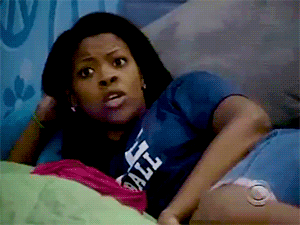
WHEN I TELL YOU I WAS UNPREPARED FOR THIS QUESTION WJSKISWJSKSJJSJSKS
but oh.... i have some thoughts:
(Let's suppose they all know their identities here except for Hawkmoth)
In season 2/3 adrien would have disappeared and so they needed a new chat noir and they put ummm idk Luka as the new chat even tho he specifically said he didn't want to
There would be changes amongst the miraculous holders because why not right?
Eventually Adrien comes back but.... there's something weird about him hmmmmmmm maybe its the hair..... they pay no attention to it but still Adrien doesnt return to being chat.... he just sticks to another miraculous ya know because it would make NO SENSE for him to return to his rightful miraculous!
Eventually they discover that this adrien isnt actually adrien!!! ITS FELIX!!!! AND HE IS WORKING WITH HAWKMOTH THE BAD GUY!!!!! Even tho he was just being manipulated and wanted to be good and have friends but of course the miracufriends dont give a crap and kill him just to get the real adrien back without mourning Felix even one bit!!
STILL adrien doesnt return to his miraculous. In FACT he has no miraculous at all!!!! He is just too tired you know?? So he is just around with little screen time making puns once in a while. Also his hair is uhhhh pink now.
Luka is just.... vibing as Chat ya know
At the same time Chloe is in a game of "is she actually good now or will she betray us????" And she does end up betraying them but they never quite explain her motives and just kill her off cause who cares right??
While in the first seasons there was a LOT of chemistry between marinette and adrien..... they said nah and went with mmmmmm oh yeah!! Marinette and Nathaniel!!! Logical right? Cause he likes her but she wants nothing to do with him romantically until like the last season where they become canon out of nowhere!!!! The power of love right fellas??
Then in the final episode in their most epic battle against Hawkmoth, Ladybug, our main protagonist, our hero, our symbol of hope...... gets killed cause well..... someone has to die right?? And it has to be her!! No other choice!!!!! No happy ending for her!!!! Miraculous of the good luck? I don't think so honey!!!!
Btw she didnt even get to say goodbye to her parents 👌🏻
And so she dies, they defeat Hawkmoth and the Miracuteam moves on with their lives. Except for Nathaniel who uhhh now is a farmer for some reason.
And Adrien................ just took a vacation
The End
I bet you enjoyed it huh
It's messy af and could have written a lot more things but take it as it is anon ujsjsjsbjsjajjsjs with a big amount of salt
#boy this was fun#JAJSHJABSBSB#vld#voltron#voltron legendary defender#ml#miraculous#miraculous ladybug#ladybug#chat noir#adrien agreste#marinette dupain cheng
182 notes
·
View notes
Note
In your opinion, why is Cloti more ideal and realistic compared to the other ship? Xoxo
Hey Anon.
I just replied to another ask regarding how important Tifa is to Cloud.
Tifa’s Importance to Cloud
The blunt, honest answer I can have on this, since you want to know the more realistic one... Aerith dies. Cloud knew her for about a month and he’s 21 in the game. The first part of the game he is mentally incapable of actually falling in love with somebody. He may THINK he has, but it’s not real. Those are words out of Aerith’s mouth. There is no way, realistically, that a guy who is 21 will stop living over a girl he knew for a month. There is no possible way for them to even have a truly meaningful romantic relationship at this point.
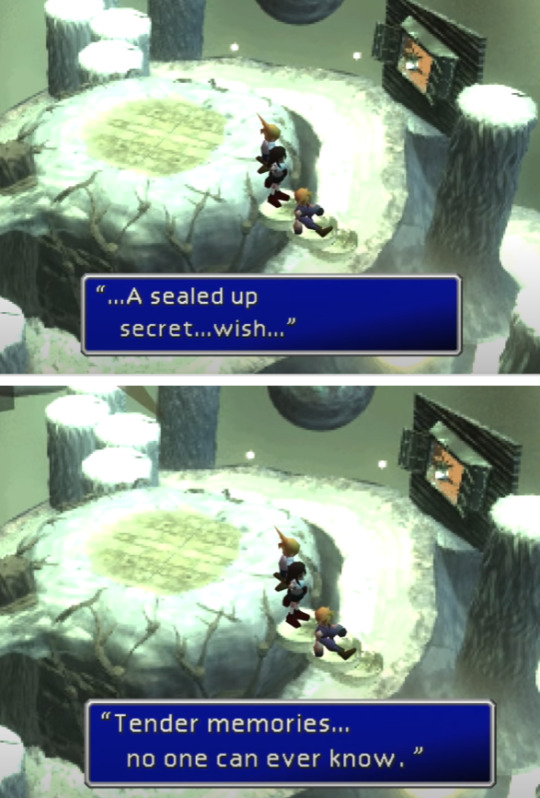
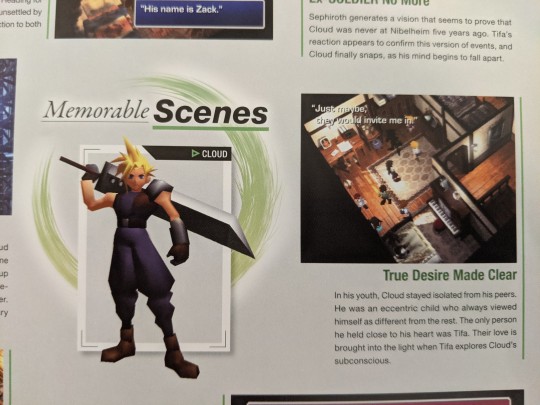
Above two: Within the Lifestream; Third Photo: From Ultimania Archive Vol. 2
The OG by itself shows that Cloud was in love with Tifa when you go through the Lifestream and rebuild his true self. This doesn’t mean he didn’t care about Aerith. Aerith was his friend and everybody else’s. He has a significant amount of guilt over Aerith’s death, which is shown and discussed in Advent Children. In Advent Children, he lives with Tifa. For the two year gap between FFVII and AC, he was happy.
The guy’s adopted kid came down with an illness that is thought to be terminal, he started having guilt around Aerith and Zack’s deaths, and he himself contracted this terminal illness. His reason for leaving is so he doesn’t hurt Tifa and his family - he doesn’t want them to watch him die. In his mind, it’s less painful for them if he disappears and dies alone.
Part of the dying process in reality is that the person will start to try and distance themselves from their family and friends. This is especially true for terminal illnesses like cancer. They did a pretty good job of showing realistically what people may go through when they know they’re dying of a terminal illness. The process actually starts about 3-6 months prior.
Signs Indicating Death is Near
One to Three months Prior to Death
•May withdraw from friends and family
•Spends more time sleeping
•Gradual decrease in eating and fluid intake
I’m not sure if you’ve ever had a terminally ill family member, but I’d say this site is accurate. I went through this with my dad. He was a Stage IV cancer patient for three years. There was a progressive change from about six months before his death to the day it happened. The list on the site above is accurate.
Tifa and Cloud are shown to have one of the more realistic relationships in the Final Fantasy series. She really does love and care for him. Even though he runs off, she waits. She’s hurt, but she believes in him, like she always has. Shit happens in relationships. People get in to fights, they get anxious and depressed over their shit in their own heads. Most of the time they’ve gotta figure out on their own how to overcome that, and their significant other is support for them. Tifa ALWAYS supports Cloud - she supports him in the Lifestream to allow him to fix his problem - she’s only there for guidance and support.
In terms of it being ideal... Well, Cloud probably would have died at the Sector 7 train station if Tifa didn’t find him. Or turned in to a black cloaked fella. So, I’d say it’s ideal since Cloud gets to stay alive and all that.
I also want to point out... Cloud isn’t just with Tifa because Aerith died. I hate that argument. Based on the game, the timing between when Aerith dies and the Lifestream, if she survived, would it really have been enough extra time for him to go after Aerith? At this point Cloud is starting to legit lose his mind. He’s already been controlled twice by Sephiroth.
This just gets worse. The next destination after the Forgotten City is the Icicle area, so you do all the snow stuff. Then it’s right to the Northern Crater. Then Cloud does his thing and is gone. I really don’t think he was comparing Aerith and Tifa at this point to figure out which one was better. I think he was being drawn to Sephiroth and was only thinking about getting there.
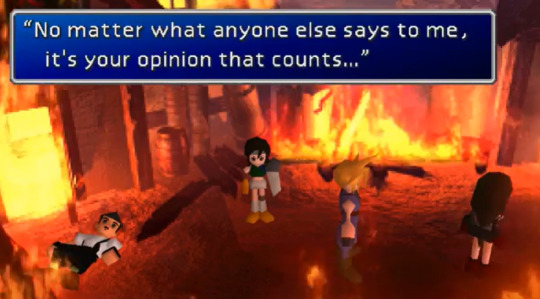
Question is, would Aerith be able to help him in his subconscious? No. I also don’t think Aerith would have interfered with Tifa in Mideel. Why? Because I think Aerith knew that Cloud had feelings for Tifa under his true persona. I think she knew Tifa had feelings for Cloud. I also don’t think she believes she could have helped him - she just didn’t know him that well. There’s also the above line... To Cloud, the only one who’s opinion mattered was Tifa’s. I think this was a roudabout way of him telling her she was really important to him.
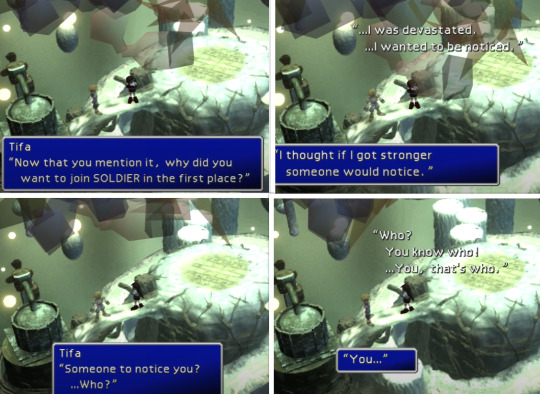
Sadly, I’m not sure if Cloud and Tifa would have survived falling in to the Lifestream, though, if Aerith was still alive. Something obviously kept Tifa safe from being killed by the high level of mako exposure. I do hope they explore this in the Remake, but my guess is Aerith helped keep Tifa alive.
It just would have never worked... If Tifa died instead, Cloud would have died after giving the Black Materia to Sephiroth. The two almost have an invisible life line between them, that if one dies, the other is either guaranteed to die or in serious danger of dying.
And no, I don’t think Aerith could have stopped Cloud from giving the Black Materia to Sephiroth at the Northern Crater. I think he would have been even worse than he was at the Temple of the Ancients. She was powerless against him there.
So from a plot perspective, a character perspective, and a rational perspective, Cloud and Tifa’s relationship makes the most sense. Pretty much, you would have had a very high chance of ending up with a different protagonist by the end of it if Aerith survived.
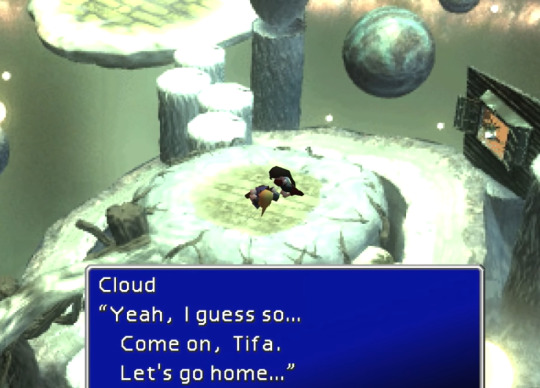
44 notes
·
View notes
Note
Are the girls from School Days even yandere considering the first actually harmed/killed Makoto?
Hey there anon. Kai here.
Not going to lie, when I first saw your question I couldn’t stop myself going “Who the fuck are the girls from School Days again?” I’m at the point where all these kawaii anime girls from these harem/dating sims stories are all blending into one grotesque creature lmao. Where’s that post on tumblr about kawaii anime girls being a different species?
Anyways, to the serious point, I’m highkey confused about how many girls are the main love interest. Just two? Ah, whatever. I’ll just talk about these two girls: Kotonoha Katsura and Sekai Saionji.
First on the chopping block is Kotonoha. I recognize this chick on every other yandere AMV on youtube lmao. But on the question if she’s a yandere or not, the quick answer is no. Here’s why:
- The multiple endings. Julie and I always say this but we hate reviewing stories that have multiple endings. It makes the water muddies and tosses around “what ifs”. Here at ThatYandereCritic, we only like solid facts; not a multiple universe theory. If there’s multiple endings, the yandere has to say consistent. But seeing how the wiki clearly states that “depending on how the protagonist treats Kotonoha, she can end up as a sweet girl or a sex crazed manic”. I don’t like that wide variety here fellas.
- Kotonoha is a cuck~ That’s right lady and gentlemen. According to the wiki, Kotonoha doesn’t really give a shit of the protag fucks other women as long as he stays with her (in one of the routes). Of course she doesn’t like it but she still lets him. We got another Deathless scenario here!!! This automatically knocks her from the running but the list continues!
- Kotonoha can develop a semi-bisexual relationship between her, Sekai, and protag-kun. At first I thought this just meant sharing but nope... that gif of Sekai and Kotonoha was very eye opening. We already established here that we don’t believe in polygamous yanderes. Once again, knocks her out of the running. (Man the Deathless flashbacks are strong with this one).
- The wiki really likes to toss around the term “yandere mode”. I know not to take the opinion from wiki as fact but I do take it as the “general opinion” of School Day fans about Kotonoha. We stated this in our yandere criteria: Being a yandere isn’t something you “clock in and out” from. It’s not a job and stated in our post, Yandere Actions 1, just having a “yandere snap” doesn’t make a yandere. Just snapping doesn’t turn on a “yandere protocol”. I know that Kotonoha is dependent on protag-kun and she does have her moments in rejecting him dumping her, but the story really seems to focus on the sexual nature of things... doesn’t look that great buddies.
As I read her wiki page, Kotonoha gave me a more “yangire” vibe than a yandere one. She pretty much just snaps under emotional trauma and that’s all there is to her character (besides the sexual part). If I squint, I guess I can see her yandere parts but it’s rather weak in my opinion and I see this more of a “hentai yandere” (Some men want to stick their dick in crazy) than a proper yandere. She only goes crazy at the sign of a possible (or very real) break up. That’s the catalysis here for a yangire snap. Yes it’s romantically charged but this was the point onwards that Kotonoha started “acting like a yandere”. If you want to call her a yandere, fine. But here? We’re considering her a yangire.
Now let’s move on to Sekai. Is she a yandere? The same as Kotonoha, no she’s not a yandere but more of a yangire. Here’s why:
- Multiple endings
- She hooked Kotonoha and protag up in the first place and started the chain reaction of events. If Sekai “possessively” liked protag-kun up until this point... why hook them up??? Especially if she’s a “yandere”??? Sounds like stupidity to me and not very yandere like. There’s also the fact that she even tried to keep her distance while the two are dating. Constancy is important here~
- “Yandere mode”
- That three way relationship with Kotonoha and protag.
While Kotonoha is a hot mess, at least there’s a weird semblance of a yandere from her. But With Sekai, she just had a mental breakdown after get pregnant, dumped, and being forced into having an abortion while all this other shit in her life is going on. Who wouldn’t crack? And no, this isn’t “yandere mode” it’s psychotic break... a yangire snap. That pregnant and abortion thing was the trigger. Just like with Kotonoha’s trigger being the break up.
TL;DR- the girls from School Days aren’t yanderes but yangires. “Yandere mode” is fake af. All these girls look the same. The protagonist is the scum of the earth and School Days sounds like a psuedo-hentai with plot.
#anon#answer#School Days#Kotonoha Katsura#Sekai Saionji#yandere#female yandere#yangire#visual novel#anime#Anonymous
18 notes
·
View notes
Text
Commission work based on the old Milf Mag fics, but now with John as the focus.
“Roxyyyyyy!” John yelled, crying out into the whitespace nothingness he found himself in, “You left your overvoided junk on my desk again! Again, Roxy!”
This wasn’t the first time Roxy had overcharged her void powers and left the results around for John to find. T-shirts, cabinets, boxes of cereal… the common thread between them seemed to be that they were so full of Void that they would try to fill themselves with whoever tried to interact with them. Well, except Roxy, of course. And so John had found himself wearing or trapped inside of various items in ways that ranged from amusing to infuriating.
And this one was definitely the latter. For starters, he couldn’t see shit, and his attempts to wiggle around and punch a hole through the off-white surface before him were being met with so much resistance he could almost swear he wasn’t moving at all.
Where the hell was this? He'd just been trying to clean the place up and hadn't really been watching what he was doing. Had he bumped Roxy's mattress and gotten stuck inside that thing? It would explain the whiteness, and maybe how restricted his movements felt, and the surface he was up against certainly felt like fabric, but something about it just didn't feel right.
But before John could put any more thought into his situation, a familiar voice came ringing out in a very familiar tone, "Oh Joooooohn... you hooooome~?"
The slight purr in her voice was unmistakable. Roxy was horny as fuck. Scooooooore!
As long as Roxy doesn't laugh at his situation so much that she kills the mood. But even with that in mind, John needed her help, so he let out what he hoped was a manly plea for assistance.
"....!"
W... Why couldn't he speak? He was speaking before, right? But now it felt like he couldn't even move his mouth! That was bad! He tried his hardest to kick and flail for attention, but again his entire body felt rigid and unmoving.
John could hear Roxy approach, but it didn't seem like she could see his attempts to wiggle for attention, "Boy Howdy I sure do feel like getting fucked by a strapping young lad and his big ol' donger!" Roxy called with absolutely no attempt to make it sound erotic. Damn, she knew just how to push his buttons!
"Haaaah... Oh wellllll." Went Roxy, and John felt the surface below him move as he heard the sounds of blankets being tossed abouy above him. But just as it seemed like his mattress theory was about to be confirmed, John suddenly saw everything in front of him suddenly moving in one great big blur of colour.
"...!!"
He'd meant to say 'Roxy', but once again his voice failed him.
Where the hell could be possibly be that would allow him to see Roxy perfectly, while unable to be seen in turn? And, more importantly, why did it make her look so HUGE?
He watched nervously as Roxy slowly slipped herself under the covers, bringing her hand up to her mouth to give her finger a lick. Even John's face felt weirdly restricted as he tried to raise his eyebrow in confusion, but thay confusion didn't last much longer as her she reached out towards him and pressed her finger on the side of his face. He was glad he still had his glasses on to protect his eyes, as her massive finger squished right up against his face, adhering him to her as she gave her hand a flick.
John knew that weird habit of hers. Roxy was reading! She always found it a little gross when she read like that, but it was far worse when it was being pressed right into his face.
He just hoped this was a good book!
As the page fell, John's eyes were treated to an entirely new world. He could still see Roxy in his peripheral vision, but now he was looking out towards what looked like some kind of black-and-white college campus... was he in a manga? Did he look like a handsome anime boy right now? No, that was a dumb thought! He needed to get his ass back into the real world!
"Roxy!" He called, relieved that he could talk again, "I'm in here! You left your stuff full of void again!"
Roxy did not respond, instead turning her head away from him. John's attempt to cry out 'noooooo!' silenced like his earlier attempts at talking. Fortunately, a sudden shift in his perspective granted him a chance to learn why. Once again he was facing outward, and he could just barely see himself on the opposite page, a pair of speech bubbles filled to the brim with text, though there was something decidedly off about the text that John just couldn't quite make out from this angle.
At least he seemed to have another speech bubble in this panel, and he quickly made his plea, "Rox! I'm stuck in this dumb book, you--"
B'DONK!
John felt a sudden pain in the side of his head as his perspective shifted again. His vision was skewed as one of his eyeballs felt like it shrunk and the other grew, and he could see action lines all around himself.
"My apologies, John-kun."
John felt like he was falling, his feet weren’t even touching the floor… no, they didn’t even seem to exist right now, as his waist eventually gave way to whiteness as it reached what must have been the edge of the page. But that wasn’t what his character was paying attention to at all, for it seemed that he was stuck in a panel where he was looking up at a tall, handsome anime fella… and blushing so much his face felt like it was cooking.
“Th-Th-Thank you?” He stuttered, even though he didn’t really feel like he should’ve been stuttering at all. It would be kind of ridiculous to be nervous about this encounter, this guy wasn’t real! He was fictional! Though… he was holding onto John with an arm around his back while their hands touched. Kind of a weird way to stop someone from falling, it didn’t even feel like a pose they could’ve gotten into from how they bonked heads. All the while, he could hear Roxy giggling.
Yeeeeeah, John had a pretty good idea what kind of story this was now, “Roxy! I don’t wanna be a part of your stupid dumb yaoi manga!” He cried, albeit now he was in a new panel where he was standing up incredibly straight, and could feel puffs of steam coming out of his ears. It wasn’t exactly uncomfortable, but he really hoped she’d turn the page soon, “I’m not even gay, Roxy!”
John’s comment apparently fell on deaf ears, as once again Roxy licked her finger and flicked the page over. He was sitting now. Great, a classroom scene. What thing was he in for here? Once again he couldn’t talk, it must have been an establishing shot, but he very quickly transitioned into the next scene, with him staring at the door at… he wanted to sigh… ‘senpai’. That handsome man was walking into room, absolutely surrounded by sparkles and flowers and rose petals.
“Oh, John-kun. I didn’t realise you were taking this class.” He said, though it was weird, because he didn’t exactly have a voice, yet John always had odd memories of him speaking, “Try not to be too naughty, okay?”
Roxy giggled. John just grumbled back, “You… do know I’m not a homosexual, right?” He asked, hoping his sarcasm would be properly conveyed. Goddammit he wished he could half-lid his eyes right now, but instead they were wide open and staring. Worse, it felt like his heart was racing in his chest. He could just barely make out lines on the side of his chest, just over his heart. Why did Roxy have to be into this stupid romantic shoujo bullshit?
John felt his scene transition again, and found a chance to speak as his ‘senpai’ took a seat next to him, “Look… You’re probably not even real, but I’m just waiting for my girlfriend to--" But John was suddenly interrupted as Roxy turned over the page, and he found himself staring face to face with senpai, uncomfortably close to his big, round eyes, “W-Woah, h-hey! You seem nice and a-all… f-fucking, this stuttering isn’t me! I-I’m just flustered because I’m being drawn this way!”
No response. John had to imagine that the guy was stuck saying whatever the original script said, just with John’s name replacing whatever the original protagonist’s name was. But even though he wasn’t talking, and John’s attempts to speak were being prevented, the two lingered on for several more panels, just staring at one-another as John began to notice more and more details in his eyes. Though with every extra line and sparkle added to his irises, John felt more and more of himself being cut away. It didn’t hurt, but he kept feeling less and less of himself, chopped away by the panel border and leaving him as just a disembodied head… then face… then eye. It was a good thing he was already drawn with shuddering lines, because that’s exactly what he wanted to do.
Smooch!
And then once again John and his character matched perfectly. His eyes widened in shock as senpai’s lips met his. His entire face felt warm again, steam emitting from all sides as his glasses comically cracked. He wanted to scream at Roxy, to tell her to turn the page, because he was stuck feeling so many over-the-top emotions that he couldn’t even pinpoint them all! But no, Roxy just seemed enamoured with the scene. From the corner of his eye John could see Roxy’s excited face, and while normally that’d be enough to make him instantly forgive all her crimes, right now he just wanted out of the kiss, and out of the book!
Thankfully, John eventually got his wish. In fact, Roxy was even kind enough to skip over a few pages, which John was sure had character development galore. As Roxy flicked through, John tried to find relief from the extreme sensations he’d felt, though it was made a bit hard as John was occasionally made to spend a few seconds or more stuck in odd positions, such as underneath senpai’s desk, ostensibly reaching for a pencil, only to instead notice a… uh… SIZEABLE bulge in the dude’s pants. It even had extra lines to emphasize just how big it was! God, why did he have to be dating a pervert? …And why was that pervert spending so long on this one panel! Big dicks had no appeal to him, except maybe in the hypothetical world where he had one himself!
“Mmmmmngh…” Roxy groaned, and John recognised the sound. Wow. That girl gets herself horny super easily, he thought. It seemed like she was turned on by the mere idea of handsome anime dick. He wished real dick had the same effect on her, that’d be fun.
The fun of imagining that idea proved an entertaining distraction, so distracting, in fact, that John didn’t even notice the subtle differences in the scene transition. No longer was he just staring at the guy’s cock… he was grabbing it!
“Goddammit Roxy!” He shouted, mentally slapping himself as he realised that he’d wasted the panel’s only text box.
“J-John-kun…” Went senpai, the next panel making John want to wretch as he saw a close up of his own hand pulling down that zipper. A feeling made worse when he realised he couldn’t even feel his own head in that shot, just a disembodied hand.
Aaaaand fwlomp! An absolutely massive cock fell out of senpai’s pants, and slapped itself down on John’s face, some unscrupulous fluids already trickling down onto his brow. “Gross gross gross gross gross groooooss… I-I hate dick!” He cried, desperate to pull away or push the thing off his face.
“Hee… hah…” Roxy giggled a bit as she panted. Her body and the entire world John was in were bouncing around. She was masturbating, and this was hentai. That realisation might have been more devastating to John if not for the fact he was already bringing the uncensored cock down to his lips, his pursed lips pressing against it and forcing him to taste the salty bitterness of pre-cum.
“Turn the page, Roxy, oh please, turn the page!” John cried, not sure how his character was meant to be talking right now, but he didn’t care, he just wanted to NOT be doing the gay thing right now and--
“HRRRCK!” John’s throat was static, but the sensation of constantly trying to force out some ten inches of manmeat from his gullet was constant. It was like he was permanently at the most intense part of having his gag reflex triggered, trying to push out the thing in his throat, even though he never could.
“Wow… John-kun… your throat is truly special…” Senpai sighed, his crotch squashed up against John’s nose.
“Mmnnn… Nnnngh…” For a moment John had thought senpai was the one moaning, until he realised that the sounds were coming from Roxy! “Nnnghh… c-cock’s too small…” She whined. John wanted to roll his eyes, this thing was already making his eyes roll back, both in the art and mentally, so calling it too small was ridiculous.
…Or it would have been, had Roxy not shown John just how big a cock could really get by bringing out a pen and adding in several crude lines in several quick strokes. What had been a small bump in his throat was now as wide as the rest of his neck, and he was made to feel the cock inside of him suddenly bloat up to match, even if it didn’t quite match with its width in his mouth. And then she made sure to go the extra mile by adding in a ballooned out belly, which was made to feel like it was rumbling and sloshing about as Roxy’s hand was made unsteady by her own pleasure.
If John wasn’t just a drawing right now, there was no way he could’ve survived all that, especially not with Roxy keeping her eyes on the panel for a minute straight as she played around with herself beneath the sheets.
When she finally moved on and John was finally moved on to a scene that was merely humiliating, he almost felt like he was in heaven.
“S-Sorry, John-kun… please take my semen bath…” Came Senpai’s melodic, weirdly disembodied voice.
“D-D-Don’t mention it.” John stuttered, this time not because of the character, “J-Just don’t, nngh… t-tell my girlfriend…” He joked, completely and utterly dazed after that last experience.
“No… John-kun… I want you to understand…” Senpai said, leaning in close to give John an unexpected hug, one that he desperately needed after the foot-wide cock he’d just had in his throat, “I… I love you.”
“S-Senpai, th-that’s…” John gasped, feeling his blush get intense again, “th-that’s ridiculous… y… you’re fictional and also not really my type. I-I’m just not… i-interested in--”
“BOH-RING!” Roxy chimed, and gave the page another few flicks. John braced himself for the worst as he prepared himself for something horrible.
“MNNNNNNYAAAARGH!” He screeched. Yep, there was something in his ass! He could feel senpai’s body over his, clutching him in a weirdly protective way, but it wasn’t enough to distract from the sheer pain of his virgin asshole being filled with a ten inch cock!
Or… oh no… “R-Roxy… please… I-I’m not gay… p-please don’t make him bigger again… p-please!” He begged, feeling as Roxy’s pen pressed into his skin, and started to drift upwards. It didn’t feel of anything, not yet. It was still just a line for now, but then she drifted to the side, adding in some bumps here and there before making her way back down again. The moment her pen was off the paper, John felt like he was going to burst, for Roxy had just added a cock-shaped bulge to his stomach that reached up almost all the way to his chin, made to feel even bigger thanks to the poor perspective on Roxy’s art.
“J-John-kun… t-tell me you love me…” Came senpai’s soothing voice, not that John cared over the overwhelming sensations of feeling himself being so ludicrously penetrated. Roxy even had to humiliate him by adding tiny little spurts of his own cum shooting out of his dick. It was a merciful relief, but it only pushed the problem further by adding yet more overwhelming sensations to the mix!
John was trapped in the middle of the most intense and yet pathetic orgasm he’d had in his life. He’d never cum from something like this before, his poor prostate the victim of two or more feet of leg-thick cock. It made it hard to think, and all he could do was try to focus on the sense of his own ridiculous pleasure to block out the sensation of being stretched to the extremes.
“Hnggghaaaaaawwh!”
John momentarily felt hopeful. Roxy’s orgasm squeal was unmistakeable. But the idea she’d free him from this mess was dashed as she watched Roxy’s body teeter about, the girl attempting to put the comic away, but instead just leaving it down on her pillow, her head landing on one page as John endured his fate on the one next to it.
How could things get worse than this?
“SNOOOOOORE!”
That was how. With a great big inhale, Roxy pulled the pages up onto her face, skipping back a few pages.
“S-Sorry, John-kun… please take my semen bath…”
John gagged as he once again felt copious amounts of spunk all over him, this time properly tasting the semen in his mouth that he’d not really noticed when coming off the heels of having his throat stuffed.
“Wow… John-kun… your throat is truly special…”
The feeling of his ridiculously overstretched throat was back! His big, rumbly belly made things feel like they were shaking, which only made things worse!
“No… John-kun… I want you to understand… I… I love you!”
Momentary comfort for John as he relived the hug, but only for a split second as Roxy began to exhale, flipping the pages all the way back to where they had just been.
“J-John-kun… t-tell me you love me…”
Senpai’s ridiculous cock was back inside John, and John was once again struck with an orgasm, or rather returned to one already in progress. It all happened so suddenly… from overfull asshole to an overfull throat and back again, and there wasn’t a thing he could do about it but be happy that he at least got some momentary relief.
“SNORE!”
“Wow… John-kun… your throat is truly special.”
Back to choking…
“J-John-kun… t-tell me you love me.”
Back to cumming…
“S-Sorry John-kun… please take my semen bath…”
Back to being made into his senpai’s cumdump…
“SNORE!”
“Wow… John-kun…”
Throat. Again.
“SNORE!”
“T-Tell me you love me.”
There was no pattern to it. John was subject to the whim’s of Roxy’s snores. All he could do was look forward to his next orgasm. …And the occasional comforting hugs of his senpai.
“I-I do love you… senpai…”
“Grubble Translate”
Roxy took a few intermittent snaps of the comic as she settled down in front of her laptop. Sure, she could spawn a yaoi doujin out of thin air, but apparently she was just straining causality a little too far to try and get one in English.
23 notes
·
View notes
Text
2018 Readlist
FAQ
Why do you read so many old books?
Because most of them belong to the public domain, and are thus freely available online. Also it is fun to see how much the past influences and creates the foundation for the present. And how much or how little has changed, and what this says about humanity.
Orwell - Animal Farm (1945)
A satire on the Russian Revolution and the failure of communism. Among other things, Animal Farm underlines the importance of learning to read properly and think for oneself, in a way that tickles with dark humor.
Orwell - 1984 (1949)
Similar to Animal Farm, 1984 is an even more systematic and total examination of a society where all history and information is tightly controlled and constantly being rewritten. Being published after WW2, 1984 trades some of Animal Farm’s humor for more serious and tragic imagery of concentration camps. In a sense, 1984 is an exploration of the possibility of mind control or brainwashing through societal-level propaganda.
Huxley - Brave New World (1932)
Absolutely fantastic. If 1984 was about what would happen if everything we read was false, then Brave New World is what would happen if no one had the desire to read at all. Brave New World shows a futuristic society that runs like clockwork with the help of genetic engineering and a miracle drug called Soma. COMMUNITY, IDENTITY, STABILITY. BNW examines the costs of a society that is mass-produced off assembly lines.
Fitzgerald - Great Gatsby (1925)
A criticism of conspicuous consumption and the Roaring 20s. You can’t bring your mansion with you when you die. Mortality sucks that way. Throughout the novel we are invited to ask ‘what makes Gatsby (the character) so great?’ From rags to riches to death, Gatsby’s lonely existence is pitiable, tragic and relatable as ever.
Steinbeck - Grapes of Wrath (1939)
Steinbeck’s illustration of the 1930s Dust Bowl and the resulting migration of impoverished families west across the United States, is a poetic masterpiece. ‘You want to work for 15cents an hour?! Well I got a thousan’ fellas willing to work 10cents an hour.’ Also featuring two of the strongest female characters in modern literature, Grapes of Wrath is a powerful lesson on human dignity.
Shakespeare - Hamlet (1599)
The more I read Hamlet, the more I come to the conclusion that Hamlet is about delay of action. In a way, Hamlet forces himself to be penitent for something he doesn’t do. The more time he spends contemplating whether or not to kill Claudius, the more time he has to beat himself up and call himself a coward, and for accidents to pile up. ‘But put your courage to the sticking place!’ Hamlet is what happens when you ask a philosopher to commit murder.
Shakespeare - King Lear (1605)
A lesson in parenting. If you want people (especially your children) to respect you, do not spoil them. Lear learns this lesson far too late, and gives up his inheritance far too early. Another possible lesson is to not trust liars, and instead divine a person’s character by their actions. The trouble is, with so much action going on behind the scenes, the opportunities for dramatic irony and treachery are twofold!
Wilde - Picture of Dorian Gray (1890)
An example of 19th century Gothic Romanticism. And also, similar to Great Gatsby, another cautionary tale against conspicuous consumption. Dorian Gray, forever beautiful, forever young, is by all appearances the outward ideal of a dandy. As the novel develops, his cruelty and vanity plunge to increasing depths.
Wilde - Importance of Being Earnest (1895)
The comedic side of being a dandy. If the suit makes the man, surely if I wear a different suit I become a different man? In a play of double-identities, love polygons and other trivialities, Earnest is a raucous upset of 19th century decorum.
Ibsen - Hedda Gabler (1891)
A complex and cruel character, Hedda’s penchant for destroying the lives of others, seems to stem from bitterness and boredom toward her own life.
Williams - Glass Menagerie (1944)
Theater is a box through which we view the lives of our fellow homo sapiens. Like passing by an exhibit at the museum, or peeking in on pandas at the zoo, Glass Menagerie presents a slice of life.
McCourt - Angela’s Ashes (1996)
A coming-of-age memoir about an Irish boy growing up in an impoverished family. From the day he’s born to the day he becomes a man, memorable moments include: father always coming home drunk, scavenging for coal to get the fire going, stealing loaves of bread, shoes made of tire rubber, having an affair with a terminally ill girl, having pig’s head for Christmas, and wearing Grandma’s old dress to stay warm at night.
Salinger - Catcher in the Rye (1951)
A tightly written story of teenage angst, about the few days after an unmotivated student drops out of a New York prep school. Unable to face his family, he wanders around the bustling city, growing increasingly depressed. Holden’s conversations with different characters throughout the novel, underline a simple moral that sometimes we just want someone to listen. (Preferably someone who isn’t a phony!)
Shakespeare - Macbeth (1606)
A bloody and ambitious soldier descends into madness after the murders the King! It can be difficult interpreting and staging the supernatural elements of the play (e.g. do you show the ghosts on stage? what about the Witches? When, why). But remember Shakespeare is writing in a time hundreds of years before modern psychology, where memory and cognition was still immaterial and mysterious. Similar to Dorian Gray (1890), Macbeth is a moral on how one’s actions affect one’s mind.
Albom - Tuesdays with Morrie (1997)
Succumbing to ALS near the end of his life, sociology professor Morrie Schwartz welcomes death with open arms. Hosting many visitors and having many conversations with family, friends, past students, the media, Morrie’s affable outlook on life and mortality shines.
Golding - Lord of the Flies (1954)
An allegory on the state of nature. One wonders if/how the story may have been different (and possibly more horrifying and prone to censorship debates) if female characters were involved. I suppose that would be a separate inquiry. Unable to see beyond the horizon, and unwilling to look at themselves, Jack and his follows almost doom them all.
Lowry - The Giver (1993)
Another science fiction dystopia in a similar vein as Brave New World or 1984, but less difficult and more relatable for teenagers. Those who enjoy The Giver, should check out the film Pleasantville (1998) featuring Tobey Macguire getting stuck in a black-and-white world. Naturally the lesson being that life is never so simple.
Naipaul - Miguel Street (1959)
A collection of short stories centered around unique characters in a slum in Port of Spain. Featuring arson, domestic violence and plenty of eccentric amateurs, Miguel Street illustrates a colorful community.
Thiong’O - Weep Not Child (1964)
Set during the Mau Mau Uprising against British colonial rule, Weep Not Child follows one boy’s goal of education. Meanwhile his family falls apart around him, and is cut off from his best friend.
Montgomery - Anne of Green Gables (1908)
Having recently been adapted by CBC/Netflix into a series (which is very good), the original novel is full of comedy, quaint coming-of-age lessons centered around school, tea parties, accidents and adventures. But despite this levity, Anne ends with a tragic turn which places it well within the realm of reality.
Shelley - Frankenstein (1818)
Another example of 19th century Gothic Romanticism (like Dorian Gray). Doctor Victor Frankenstein becomes obsessed with the idea of creating life from inanimate material, only to spurn his own creation just after giving life to it. The monster, filled with rage and envy, murders Frankenstein’s dearest friends. A sort of cautionary tale in the same vein as Doctor Faustus by Marlowe, Frankenstein is a counter-weight to the enthusiasm around science at the time. That science can not only produce miracles, but also horrors in its own way if one is not careful.
Anderson - Winesburg Ohio (1919)
A collection of short stories revolving around a small community (similar to Miguel Street). Themes of religion, old age, loneliness, love, feeling stuck in a small town, Winesburg is full of some of the most heart-rending stories in all literature. Also Winesburg manages to accomplish a unity of themes in very short space. The whole of Winesburg is much more than the sum of its parts, such that it can stand just as well against other great novels.
Bronte, Charlotte - Jane Eyre (1847)
One could argue that Jane Eyre is the predecessor to Anne of Green Gables. The latter frequently references the former, both are about orphan girls who grow up successfully in the face of many adverse challenges. While Anne ends with the protagonist becoming a young adult, Jane Eyre ends with a more traditional romantic happy ending, but like Anne is not without its tragedy.
Bronte, Emily - Wuthering Heights (1847)
Fun fact, Wuthering Heights was a novel I considered doing an independent study essay on, but didn’t since I didn’t know anything about literature back then. Although technically of the gothic genre, Bronte primarily uses cruelty and domestic violence to evoke scenes of horror, as opposed to ghosts and monsters, while at the same time using these as tools to explore very down-to-earth themes of social class and gender inequality.
Joyce - Dubliners (1914)
Very similar to Winesburg Ohio, but without the same unity. For example, one story is difficult to read without first reading about the history of Ireland. There are some tear-jerkers and lovely metaphors. For example the final metaphor of “snow falling faintly through the universe”, is a variation of the oft-used metaphor of flowers. How they bloom for a short period then die. What is new with this metaphor is that each snowflake is unique, thanks to the chaotic tumbling of water droplets through the atmosphere, just like how every live is unique. But all snowflakes much reach the ground some time and then melt away into nothingness.
#reading#literature#shakespeare#romanticism#gothic#19th century#20th century#bronte#shortstory#novel#philosophy#1984#orwell#huxley#brave new world#jane eyre#anne of green gables#macbeth#oscar wilde#catcher in the rye#great gatsby#grapes of wrath#public domain#education#fiction#history#humanities
44 notes
·
View notes
Note
Mind clarifying that last post?
(This is in regards to a short post I did earlier saying how Future Mai in DBS was treated with a lot more respect and was less objectified than Pan was in Dragon Ball GT, in case anyone’s wondering. I wasn’t able to write this response straight away).
Pan is technically the secondary protagonist of GT, considering she’s the one that gets the most screentime after Goku, continuing to have a seemingly prominent role even after Trunks had been demoted to extra. But she never actually does anything to justify it.
In an interview that was recently translated, which I’ll link below, the writers of the show admitted that the role they planned out for Pan was to be beaten up by the villains so Goku would look stronger by comparison. It shows.
In episode 5, the climax to a mini-arc starting off the first saga, Pan attempts to attack the villain of the episode… but then immediately gets trapped in some kind of forcefield or something. Admittedly Trunks also gets one-shot by the guys bodyguard before Goku fights him, but the trend continues for Pan’s future appearances. During the Machine Mutants arc it looks at one point after grieving over Giru’s apparent betrayal that Pan was going to do something to fight the villains herself… only to soon after get captured anyway, and it’s Trunks and Giru who end up saving the day.
During the Baby saga she gets beat up pretty much every time she gets into an action scene, usually by her own possessed father, and her own plans to try and save the day end up failing pitifully and she needs to be rescued by Uub or Goku at various points.
While she got to blow up a few people from the Red Ribbon Army in the Super 17 saga (Hardly an impressive feat though, considering how weak they are at this point), her only active attempt to save the day where she took Dr Gero hostage ended up being for nothing as Dr Myuu was a backstabbing coward, and then Pan was helpless against Super 17 of course.
In the Shadow Dragons saga she does beat up on Haze Shenron at first, but then gets subjected to Haze Shenron’s toxic mist that strips her and Goku of their power, making it look like she almost screwed them both over by not just finishing the otherwise joke villain off right away instead of just throwing a fit and wailing on him for the sake of it because he insulted her.
Then later in the saga she gets taken as a hostage by both Naturon and Eis Shenrons, and does pretty much nothing of value in the final battle against Omega Shenron, with it being Vegeta, who’s only actual role in GT up to this point was to get body-jacked by Baby, gets to go super Saiyan 4 to try and help out.
The only times Pan gets to be all that helpful in battle are against Lord Luud and Oceanus Shenron, and in both instances it’s alongside Goku, so she never gets a serious fight that she wins by herself (And honestly, Goku never even powers up that far against Oceanus Shenron, and both characters are borderline filler villains anyway), and they’re both followed up by really bad worfing in the episodes after, so any attempt to make Pan seem relevant or dependable rings hollow.
The only truly significant contributions Pan makes is in helping Golden Great Ape Goku get a grip on himself and thus becoming super Saiyan 4, and then helping power a weakened Goku up again with the other part-Saiyan characters while Majuub stalls Baby. That’s Pan’s moment of glory as the secondary protagonist, helping a male character gain a transformation. And don’t get me wrong I loved that scene, it’s one of the best in GT and very touching, but it’s systematic of how Pan is treated throughout the series.
Because aside from that, she isn’t treated with a ton of respect. She’s portrayed as a whiny brat who keeps trying to prove herself when people tell her to stay out of things, but she ends up often causing more trouble as a result of that and things only working out for the best purely by coincidence, like her causing the spaceship to crash land on the planet Giru was on. She frequently has to be rescued despite being overconfident in her own abilities.
Episode 15 has her run away from the group into a scorching desert planet when she finds out that Trunks and Goku are quite understandably planning to drop her off at earth and switch her out with Goten now that they know there are villains after the Dragon Balls, which nearly gets Pan killed via heat exhaustion and giant man-eating insects that Giru has to rescue her from.
And then at the end of the episode, Trunks says he was wrong for thinking of sending her back to earth and allows her to stick around on the basis of “Hey, you found us the dragon ball and an oasis”, which Pan explicitly points out that GIRU found, she wasn’t even looking!
The episode tries to end on a note of Pan proving herself somehow and that she is dependable, when the actual content had her proving without a doubt that NO, she is NOT responsible, NOT capable of looking after herself and that Trunks was RIGHT to want to send her back to earth. It completely undermines her character arc beyond redemption, and makes Trunks and Goku look like irresponsible IDIOTS who think it’s okay to drag incompetent CHILDREN into battle, which is just full of so many unfortunate implications.
The most actual development she gets throughout the series is that she gradually becomes less bratty as time goes on, but even then none of the other problems are addressed.
In fairness, every other character in the show that isn’t Goku suffers a similar problem of not accomplishing much and getting easily beat up so Goku can do most of the fighting that matters, but it’s really noticeable with Pan in that she’s apparently meant to be of similar prominence in the cast to Gohan in Z.
Think of it, Gohan’s moment of glory in DBZ was going super Saiyan 2 and defeating Cell, and despite not being able to beat Super Buu he still gets some decent fights and good character growth in the Buu saga. And plenty of decent development throughout the show as a whole.
Or even take Vegeta in Super, where he’s the secondary protagonist of that show. Vegeta in Super got to go super Saiyan blue purely through training really hard, thus one-upping Goku who initially reached the power of the gods through a ritual. He defeated 3 people from the universe 6 team in the Champa saga and gained Hit’s respect for lasting longer against him than any other opponent he’d fought, got some decent moments towards the end of the Future Trunks saga where he briefly overpowered Goku Black, and then in the universe survival saga he got to take out half of universe 9 alongside Goku, eliminate a number of other minor opponents, before ultimately defeating Toppo, a newly-ascended GOD OF DESTRUCTION. I have my issues with how the last one was carried out, but you can’t say his contributions were minor or not impressive.
Pan doesn’t get nearly as good character development as either Gohan or Vegeta, certainly not as good as Goku, she never even goes super Saiyan, and she’s pretty much shown to be a burden outside of a few cases despite the show trying to go “Well, actually”, and her ultimate role in the grand scheme of things amounts to emotional support (Gee, a female lead who’s main role is to prop up a man. Nothing iffy about this, huh fellas?). And meanwhile, other characters like Uub and Vegeta are the ones who get to have transformations and significant fights with main villains, even if they do amount to pretty much nothing in both cases.
And beyond that, she’s weirdly sexualized at various points. Re-watching the subs for the Black Star saga, I’ve noticed an odd number of shots where the camera seems to linger on her butt momentarily, with her pants being oddly form fitting. There’s that disturbing scene later on in the saga where Pan gets outright turned into a doll, and Dolltaki starts playing with her and even tries to undress her, with Pan freaking out because he’ll “Ruin her as a wife”, and the creep even tries to kiss her when they’re trapped inside Luud. And then there’s that weird scene in the baby saga where a deer starts trying to nurse from her. And she’s NINE in this series.
Considering there was also a scene where two adult men were hitting on Bulla, I get the impression that someone on the writing staff might have been on the creepy side.
Honestly altogether, Pan’s portrayal is pretty horrible and disrespectful for a character who really deserved a lot better than what she got.
Contrast that with Future Mai, who despite being a non-powered human is surprisingly more competent and useful for how she’s written in the Future Trunks Saga of Super. While she needs saving on occasion, she pulls Trunks as well as Goku and Vegeta’s butts out of the line of fire just as often as Trunks saves her, and is proactive in trying to help take down Goku Black.
When her attempt to snipe Black with a high-powered energy blast fails for example and Trunks shows up to fight him, she takes another shot at Black that creates an opening for Trunks to start beating up on him. She gets multiple moments where she gets to help out, and she’s also responsible for looking out for the remaining civilians of the Future timeline when Trunks isn’t around or incapacitated.
Despite being a love interest for Future Trunks, Mai is still competent and her main priorities aren’t on Trunks, their romantic chemistry is downplayed since she’s dedicated to protecting the future earth and it’s people, and she’s written as competent, brave, selfless and is treated by respect by the resistance soldiers who all seem to take orders from her.
For her role in the story, the show treats her with a good deal of dignity and she’s allowed to be proactive. She’s probably a good go-to example of how you can have a non-super powered supporting character in Dragon Ball still be useful to both the action and the overall narrative of a story. Oh, and also, she doesn’t suffer from any creepy sexualisation like Pan does!
I’m not saying the writing for Future Mai was perfect or anything, for one thing she feels more like an original character a lot of the time since they don’t really bring up her past or connection with the Pilaf Gang outside of one joke, and the romance with her and Future Trunks could have been built up a little more (Though it’s still at least a lot less squicky than the thing with present Trunks and “Kid” Mai. Ick), but she was at least treated with dignity.
The only reason I wrote that snarky post comparing the two is because Mai shows how pathetically easy it is to write a female character respectfully, while GT Pan is like the ultimate example of how to screw things up with a female protagonist. It’s honestly some of the worst character writing I’ve seen in this franchise, I’d say she was the worst example period but that’s debatable considering how badly Uub was also mishandled in that show.
http://www.kanzenshuu.com/translations/dragon-ball-gt-dragon-book-gt-back-then-kozo-morishita-interview/
23 notes
·
View notes
Photo
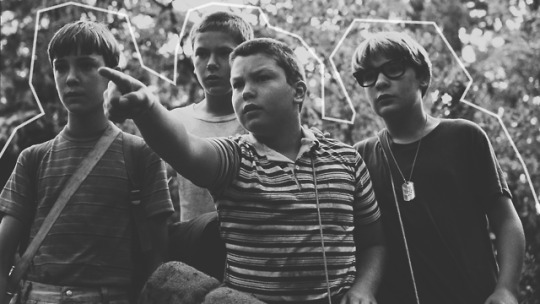
What’s Better Than This? Guys Being Dudes
Read on Post Culture
The End of the Movie
Despite being a child of the 90s I consider myself a super fan when it comes to 80s movies. Every month my local Alamo Drafthouse movie theater holds viewings for older movies and I always try to make at least once a month. Last month it was Nick Castle’s The Last Starfighter.
The first 80s movie I remember falling in love with was the Spielberg classic Stand by Me. Stand by Me was a coming-of-age story about a group of friends who go in search of a rumored dead body. Along the way they meet a host of characters and challenges that send them on individual journeys of self-discovery.
Even back then I couldn’t help but draw comparisons to another childhood-best-friends coming-of-age movie I’d seen: Now and Then. Now and Then was billed to me as Stand by Me, but for Girls. Instead of a group of boy friends going on an epic journal of self-discovery to find a dead body, the audience was treated to snapshots of summer spent with a group of girls who just wanted to buy a treehouse together and maybe put a disturbed spirit or two to rest, too.
Both films share themes that are integral to all coming-of-age films, most importantly growth and independence. At the end of Now and Then once the girls have secured enough money to buy their treehouse Samantha comments that “The tree house was supposed to bring us more independence. But what the summer actually brought was independence from each other.” The idea is sweet and profound, made even more so by the opening reunion between the friends, now all grown-up, and the promise they make to each other at the end to visit together more often.
The end of Stand by Me is noticeably different. After our brave heroes overcome trials and the perils of pubertal self-discovery and find the dead body, the adventure, and summer, are over. A flashforward narrated by Gordie tells us that the boys drifted apart with age. Teddy and Vern became passing figures in Gordie’s life. He remained close with Chris through college until he went off to university—then died breaking up a fight at a restaurant. This prompts Gordie to write the famously heartstring-pulling line: “I never had any friends later on like the ones I had when I was twelve.”
I remember casually asking my dad at the end of Now and Then why the boys didn’t stay together like the girls. His response? “They’re boys.” Like that explained everything. At the time, it actually kind of did. There was a reason the men in the movies I saw didn’t hug or talk about their feelings like the women did. In fact, attempts at intimacy or emotional connection between male characters were either played for laughs or shown as a cautionary tale.
“They’re boys” was the simple answer to a complex problem, but like most moviegoers, I was content to leave it at that.
But now that I’m older I have to ask why? Why are boys expected to sever ties with the people they care about when they grow older? What kind of Wormer Brothers-level havoc does puberty wreak on boys that it seemingly spares girls?
The answer is a lot less mystical than dead bodies or resurrected spirit.
Dude, Where’s My Emotional Intimacy?
Gordie’s line about never having friends like the ones he had when he was twelve isn’t isolated fiction. Boys tend to form closer bonds with other boys in childhood and almost seem to “lose” the ability to later. Sociologist Lisa Wade theorizes that around the ages of fifteen and sixteen teenage boys start learning what it means to “be a real man,” and the feminine-coded traits of friendship do not fall into that ideal.
In her book Deep Secrets: Boys’ Friendships and the Crisis of Connection psychologist Niobe Way followed boys of varying ages over four years to chronicle their views on friendship. Wade highlights a particularly devastating part of her research in which a 15-year-old boy named Justin was asked to describe his feelings towards his best friend at two different parts of his life:
[My best friend and I] love each other… that’s it… you have this thing that is deep, so deep, it’s within you, you can’t explain it. It’s just a thing that you know that person is that person… I guess in life, sometimes two people can really, really understand each other and really have a trust, respect and love for each other.
By his senior year, however, this is what he had to say about friendship:
[My friend and I] we mostly joke around. It’s not like really anything serious or whatever… I don’t talk to nobody about serious stuff… I don’t talk to nobody. I don’t share my feelings really. Not that kind of person or whatever… It’s just something that I don’t do.
Niobe’s interviews with boys are both eye-opening and heartbreaking. At one point she interviewed a freshman named Jason who touted the merits of friendship as having someone to turn to. Three years later she asked Jason if he had any close friends and he “said no and immediately [added] that while he nothing against gay people, he himself [was] not gay.”
Despite popular belief, men actually desire (and need) emotional intimacy just as much as women do. In fact, not having those emotional connections contribute greatly to men’s health problems.
So if men want it, and the lack of it might actually kill them, why can’t they have it?
Heterosexual men are taught that the romantic and sexual relationships they have with women are the only acceptable source of intimacy and closeness they’re allowed to have. That’s often why straight men feel the need to caveat any positive, slightly friendly interaction with another male with “No homo.” Popular belief is that if a guy is showing affection to a person he must want to date or have sex with that person. Hence the word bromance. Know what the female equivalent of a bromance is? A friendship.
Friendship between men is such a delicate walk between ‘just-guys-being-dudes’ and ‘full-on-homo’ that its become almost regulated. Telegraph’s Chris Moss posted a handy guide titled “A fine bromance: the 12 rules of male friendship” that featured such ‘rules’ as this:
Never openly verbalise that you value the friendship.
Most men avoid literalness. There’s something vulgar about declaring “how important you are to me”. But there is also a kind of mysticism in never quite affirming that this might just be the second, or even the, central love in your life. Sometimes stating the obvious makes the obvious deteriorate or vanish. So respect the given; you can always weep openly at a friend’s funeral.
Even with the wink-wink-nudge-nudge aspect, it is still depressing to think that men have to edit their feelings in an effort to not make the people they care about uncomfortable. The other day on Twitter a virtual (female) stranger told me she loved me. In line at the checkout at Walgreens, I overheard a man say to his (male) companion “That’s a nice shirt, man. No homo.”
The restrictive range of what’s considered “acceptable” emotions men are allowed to feel are just some of the ways the patriarchy takes a toll on men, and it has real-life harmful effects. Misogyny and homophobia are core driving factors to this epidemic, and what’s worse is that it’s become normalized. One way society is both chronicles and reinforces these unwritten rules of masculinity? Movies.
It’s important to remember that things haven’t always been this way for men. Silver screen blockbusters show us that at some point in time a fella could hug another fella after a shootout without anyone feeling the need to qualify it with a “No homo.”
So where did it all begin to turn?
Blow Your Wig
Because platonic intimacy between men wasn’t vilified in early years, depictions of strong bonds between men were actively depicted in cinema. In fact, the first same-sex kiss on screen in the 1927 silent film Wings was an entirely platonic kiss between two male infantrymen (Buddy Rogers and Richard Arlen).
Audiences didn’t so much as bat an eye at the kiss. It went on to become a critical success and won the first ever Academy Award for Best Picture.
Another early 20th-century film that highlighted male friendships was the bad boy classic Rebel Without a Cause (1955). Let’s be honest here for a second, folks: James Dean wasn’t that great of an actor, he was just handsome (don’t @ me). That mug put butts in the seats for his performance as Jim Stark, the film’s troubled teenage protagonist just trying to make it. Aside from James Dean’s bad boy good looks the most memorable aspect of the film is Jim’s friendship with even more troubled outcast Plato (Sal Mineo). Jim’s feelings toward Plato take on a paternal tone, helping them both make up for something they lack. For Plato, it’s a stable, loving family. For Jim, it’s a sense of what it means to be a real man. Unusual as their dynamic was people were touched by love and care they shared. That’s further complicated when you look a little harder, but that’s a conversation for another time.
What’s Your Damage?
The 1980s and 1990s gave rise to the timeless buddies trope. Buddy comedies were defined by their “odd couple” approach to hyper-masculine films. Movies like 1988’s Midnight Run took the tried and true formula and flips it on its head, but still stays true to the hyper-masculine-odd-couple trope.
The most popular of this genre is the buddy cop film. The Lethal Weapon franchise (1987) is often credited with starting the movement in films, and sure enough, helped define other films in the genre. You take one by-the-book veteran cop, mix in a younger, more hair-trigger partner, throw in a few explosions and shootouts for maximum masculinity, and bam, you’ve got yourself a buddy cop film.
Because the men themselves were in a profession defined by its hard-shelled masculine nature the characters were allowed—in small doses—a degree of intimacy between one another. You wouldn’t catch Martin cathartically kissing Robert Thelma & Louise-style after one of their many near-death experiences, but the average heterosexual man wouldn’t feel too weirded out over an affectionate clap on the back or mildly fond poses in marketing materials.
The late 80s and early 90s also gave birth to a peculiar kind of cinematic take on male friendships I like to call Feelings Are Gay and Bad.
Unlike the buddy movies of the same decade, these films wielded homoeroticism like an Aesop’s Fable in 35mm. Rather than depict male friendships as the begrudged act of two hardened, red-blooded American males, these films opted to show brutal, all-consuming homoerotic unholy unions that eventually came to screeching—and often deadly—halt. A character who placed his love and care with another man would come to rue it by the film’s end or would learn a valuable lesson about vulnerability.
In Reservoir Dogs the audience watches as Mr. White lovingly cradles a wounded and terrified Mr. Orange in his arms. In between horrifying, blood-soaked scenes in the present we’re privy to Mr. Orange’s secret: he’s an undercover cop working to bust White’s crime ring from the inside. Blissfully ignorant, White soothes and protects him. He even goes so far as to pull a gun on the man in charge for threatening to kill him. After the infamous Mexican stand-off, White crawls over to Orange’s body as the police close in, only to be told Orange is actually a cop. The movie closes in on White’s anguish as the police surround them.
Kathryn Bigelow’s Point Break (1991) introduced the world to Special Agent Johnny Utah (birth name Heterosexual McManlyman), former football star and current by-the-book FBI agent who goes undercover in a group of adrenaline junkie surfers and becomes dude-smitten with their charismatic leader, Bodhi. The explosions, killer surfing scenes, and the fact that Special Agent Johnny Utahis a former Rose-bowl winner and current gun-wielding badass makes it okay for male audience members to laugh at lines like “We gonna jump or jerk off?”
Nick Schager of The Daily Beast referred to Point Break as “A Homoerotic Classic.” Whether Point Break is a cautionary tale about getting too close or an intentionally subversive homoerotic film a female director remains a hotly contested.
The film adaption of Anne Rice’s Interview with the Vampire (1994) and David Fincher’s take on the Chuck Palahniuk classic Fight Club (1996) both use their source materials’ explicit homoeroticism to make the story darker and grittier. In Fight Club’s case, this was used in conjunction with what many feminists consider a critique of hypermasculinity, made with the intent to draw straight men to watch and leave rattled. For Interview with the Vampire, while Anne Rice’s intent was clear, some parts had to be altered considerably for consumption.
During this decade films of this kind also started to utilize the Deranged Homosexual trope. Poor, unfortunate heterosexual men would offer their friendship and find themselves in the grips another, obsessed and subtextually sexual man. The Talented Mr. Ripley (1999), another novel-to-film adaptation, takes the time to build up the dynamic between Tom and Dickie from budding friendship to growing obsession until Dickie’s ultimate death at Tom’s hands.
The 80s and 90s weren’t the purgatories of male friendships, though. For every Cable Guy(1996) there was a Sandlot (1993) after all. Still, the trend in media portrayals of male intimacy in films during this era set a particular tone that went virtually unchallenged until the following decade.
Isn’t It Bromantic?
The 2000s were the start of the “exclusively comedy” buddy films. In contrast with buddy films of the 80s that were action films that sometimes featured comedy, the male friendship movies of the 2000s were comedies that sometimes featured action.
The 2000s also saw a rise in the use of the term bromance or bromantic comedy to describe close male friendships. Even the word bromance evokes a mocking callback to romance, self-deprecatingly lampshading the connotations of two men being emotionally intimate. ‘Bromance’ takes the idea that men are emotionally illiterate and incapable of showing care without sexual or romantic inclinations and applies it homosocial relationships. In other words, the word ‘bromance’ pretty much plays itself. So started the attempt to strike a balance between “Fuck yeah, friendship!” and dudebro-ish mocking.
And mock they did. It was as if the homosocially-propelled films of this decade were constantly at war with their desire to show the close bonds men can foster with each other, and their need to assure the men watching it that yes, they know how “gay” the idea sounds.
I call this the “No Homo!™” movement.
When The 40-Year-Old Virgin premiered in 2005 it marketed itself as a raunchy, stupid, over-the-top sex comedy for men. Steve Carell plays Andy Stitzer, the eponymous forty-year-old virgin. After it’s revealed to his friends that he’s never had sex he’s put on a quest to lose his virginity as quickly as possible. This devolves into a series of cheap laughs, dubious sexual situations and, of course, rampant transphobia and homophobia.
The movie focuses on Andy’s quest (spoiler alert: the real loss of virginity was the self-discovery he had along the way!) but the B-plot belongs to two of his friends/bullies: Seth Rogen’s Cal and Paul Rudd’s David. The two spend most of the money bickering and insulting each other by making jabs at who’s “gayest” (“You wanna know how I know you’re gay? You like Coldplay.”) The jokes are cheap and unfunny but are sure-fire ways to get a chuckle out of your standard insecure bro-type.
At the end of the film after Jay apologizes to Andy for pressuring him into losing his virginity the two hug and embrace. In a call back to Cal and David’s game Haziz, their manage, comments snidely:
Haziz: Do you know how I know you guys are gay? You’re holding each other ever so gently.
This allows the film to reassure the audience that despite the lovey-dovey shit that’s just happened this is still a dude film.
Some praised The 40-Year-Old Virgin for “deconstructing the bromance formula,” but when compared to other films in its decade we can see its done nothing of the sort.
After the commercial success of The 40-Year-Old Virgin, we were treated to another Apatow-Rogen bromance film with Superbad (2007). Superbad brought Jonah Hill and Michael Cera together as Seth and Evan (named after writers Seth Rogen and Evan Goldberg), two high school seniors desperate to lose their virginity before college. Despite the classic pitfalls—Seth Rogen himself later said jokes in the movie were “blatantly homophobic”—the movie handled the friendship between Seth and Evan with surprising care. During a quiet scene, Seth (drunkenly) confronts Evan about rooming with their mutual friend in college. Evan apologizes and admits he’s afraid to live alone. The two make up and say they love each other, then wonder aloud why they’ve never said they loved each other before.
Evan: I love you. It’s like, why can’t we say that every day? Why can’t we say it more often?
Seth: I just love you. I just wanna go on the rooftops and scream “I love my best friend Evan.”
Sure, they’re drunk and it’s comedic, but the comedy is more about their drunkenness than their love for each other.
At the end of the film the two friends meet up with their respective love interests at a mall and go their separate ways. This reminded me of the end of Stand by Me (and that is the first and last time you’ll hear me compare Stephen King and Rob Reiner to Seth Rogen and Greg Mottola): boys with a fierce bond drifting apart as evidence of their maturity and growth. As if the moment they spent telling each other they loved one another the night before was meaningless.
Seth Rogen, you sonofabitch.
Riding off the rise of Seth Rogen’s bromance comedies came I Love You, Man (2009) which tried to brand itself as the “bromance” movie. The movie set out to answer one question: Why don’t men have friends? The answer was a resounding “Uhhh?”
Peter Klaven (Paul Rudd) goes in search of a best guy friend after realizing he has no one to be his best man at his upcoming wedding. After going on a misfortune of “friend dates” he runs into and befriends smooth con man Sydney Fife (Jason Segal). I Love You, Man starts off as Feelings Are Gay and Bad and ends up a lukewarm reunion that skirts clumsily around the subject of real emotion like Jason Segal on a moped.
The only reason I rip on I Love You, Man is because it truly could have been groundbreaking. At the time it was considered groundbreaking because for once the premise of the movie was about male friendship. Not friendship plus virginity and booze, just friendship. It went even further to prove its progressive cred by introducing Paul’s But-Not-Too-Gay brother Robbie (Andy Samberg) as a shining example of sports-and-meat-loving masculinity. Still, despite its failure to truly commit, I Love You, Man managed to make a bromance film that didn’t rely heavily on sex and slapstick to validate itself as a “guy’s” movie.
Other notable bromance films of this decade like Dude, Where’s My Car? (2000), Harold and Kumar Go to White Castle (2004), and The Hangover (2009) also used similar tactics of highlighting friendship and neutralizing the discomfort of seeing intimate male friendships via homophobic language, slapstick comedy, objectification, and more. The self-deprecating overcompensation that defined the movies of his decade was a reflection and reinforcer of America’s evolving feelings towards male intimacy. It was no longer “Don’t be intimate with your male friends” but “Don’t be too intimate with your male friends.”
Men Have Feelings, Too (And That’s Okay)
Things began to subtly shift for bromance movies in the 2010s. Slapstick and Seth Rogen still reign supreme, but now there was a softer and more forgiving edge to it all. Conversations on hypermasculinity and homophobia were propelled into the mainstream to start a national dialogue. The idea of what it means to be a man and what masculinity really means started to change as did their portrayals in film.
“Your average dudebro” is the very demographic that needs to see these kinds of relationships normalized in the first place.
You could argue that Seth Rogen is the kind of bro comedies. He’s produced such nerdboy-testosterone, weed-filled slapsticks as Pineapple Express, Superbad, This is the End, and Game Over, Man! Whether as an actor, director, producer, or writer, Seth Rogen’s name has become synonymous with the kind of obnoxious bro-rock marketing execs don’t even consider women a demographic for.
But I would argue that much of the normalization of intimate male friendships comes from your average Seth Rogen film. Most of the time these are “dumb fun” comedies. That’s not to say other films by other people don’t portray male friendships just as well, but while movies like Magic Mike XXL (2015) are heartwarming examples of the kind of power platonic male intimacy can have they’re not as likely to be watched by your average dudebro. “Your average dudebro” is the very demographic that needs to see these kinds of relationships normalized in the first place.
The 2011 comedy-drama 50/50 cast Seth Rogen as Kyle Hirons, a man watching his best friend Adam (Joseph Gordon-Levitt) undergo chemotherapy. Even though he doesn’t possess the necessary bedside manner he plants himself as Adam’s rock (and wingman) through his treatment. When Adam’s girlfriend cheats on him he angrily confronts her to defend his honor.
The film is at times tone-deaf and crude as any movie starring Seth Rogen and directed by Jonathan Levine is wont to be, but the message at its core is sweet and powerful.
In the controversial Netflix film The Interview (2014), Seth Rogen balances crude humor and James Franco-ness with an almost careful tenderness between the two male leads. During the penultimate scene where Dave and Aaron are preparing to walk to their deaths in order to save North Korea, the two share a quiet, intimate moment together discussing Dave’s hypothetical biography.
Dave: As the two best friends stared into each other in the eyes, they knew that this might be the end of a long road. But they also knew how much they meant to each other. And even though neither one could say it out loud, they were both thinking…
Aaron and Dave: [whispers] I love you.
What shocked me about this scene wasn’t just that two men had said they loved each other in an action-comedy, it was that the scene was played straight. No jokes, no thrown in “No homo!” It didn’t make up for the rest of the film, but it furthered my appreciation for Seth Rogen.
Another unexpected gem in the same vein are the 21 Jump Street movies, specifically its sequel 22 Jump Street. In 22 Jump Street we’re re-introduced to Jenko and Schmidt, who are assigned to go undercover at a college to find out what student has been dealing the drug WHY-PHY. Jenko gets close to a suspect in the investigation–the popular, athletic Rooster–and starts to blow off Schmidt, much to the latter’s dismay.
While Schmidt does spend a not insignificant portion of the film playing a comical version of a scorned lover for audiences to point and laugh it, you can’t knock 22 for trying to tackle a virtually undiscussed issue in male friendships: jealousy. This is pleasantly resolved near the end of the film with Jenko assures Schmidt that he lifts him up—while they’re dangling from a helicopter, but still.
There are plenty of other films from the 2010s that truly flip the script on your standard movie bromance (Due Date [2010], The Green Hornet [2011], and even This is the End [2013] if you’re in the camp of thinking they did rape jokes the right way) but I’d like to wrap up with one that’s dear to me: Seth Rogen’s Neighbors (2014).
On premise alone Neighbors sounds like your run-of-the-mill ignorant bro comedy. Mac and Kelly Radner (Seth Rogen and Rose Byrne) get into a prank war with the Delta Psi Beta fraternity that’s moved next door, headed by Teddy (Zac Efron) and Pete (Dave Franco). The humor is slapstick and borders on gross at times but is absent the casual bigotry that early Rogen/Goldberg films weren’t shy about including. Of note is Pete and Teddy’s relationship. It’s revealed that Pete slept with Teddy’s girlfriend, and even though this causes bad blood between the two Teddy still sacrifices himself when the police show up to spare Pete’s bright future.
Neighbors 2: Sorority Rising (2016), though, by far takes the cake for the best of the two. It opens on the old Delta Psi brothers assisting Pete’s boyfriend Darren in a Jason Mraz-inspired proposal. Having peaked in college, Teddy lives on Pete and his boyfriend’s couch. This comes to an end after the proposal and the two friends having a falling out, prompting Teddy to leave in search of a place to feel wanted. When crashing with the Radners doesn’t work out he moves on to a struggling sorority.
The decision to make Pete bisexual (or gay) was a conscious one suggested by writer Evan Goldberg and reporter asking director Nicholas Stoller why he’s never had gay characters in his films.
At the end of the film, Teddy and Pete make up in time for Teddy to plan and be the best man at his wedding. Before walking Pete down the aisle Teddy stops to give him a pep talk:
Teddy: You all right? You seem really nervous.
Pete: I’m having a little bit of a meltdown.
Teddy: Just remember, man, Darren loves you more than anyone in the entire world- Darren cherishes his friendship with you. Darren can’t imagine his life without you. And Darren is proud to call you his best friend.
Pete: You’re not talking about Darren, are you?
Teddy: No, not really.
The humor stays intact and without the expense of losing intimacy. Teddy is even allowed to tear up with pride and happiness for his best friend in full view of the camera before the scene is over.
And you still get a poop joke.
A movie that utilizes Seth Rogen, Zac Efron, and Dave Franco and a plethora and copy-and-paste frat bros to chastise against using misogynistic slurs (“Don’t call them hoes. That’s not cool anymore.”) and normalize gay love is a feat in and of itself. You could argue that the movie tries a little too hard to seem progressive and open-minded (at one point Teddy helps the sorority throw a Feminist Icon Party that features three different Hillary Clinton costumes) but the effort is genuine and appreciated. The film doesn’t equate masculinity with misogyny and homophobia. It allows their funny frat bros to show vulnerability and care for one another in a way that promotes laughter but doesn’t mock.
The expected bro humor isn’t sacrificed in favor of these progressive elements either. There are women in bikinis, babies holding sex toys, and unnecessary dick and poop comedy. All the elements that define a sleazy bro comedy but without the sleaze.
These movies are important to show that men being vulnerable and caring about one another doesn’t have to be something shameful, or something that comes with rules, or something that should be laughed at. Looking back on the up-and-down progression of these portrayals is at times hilarious, but are mostly sobering and sad. We should promote and support portrayals intimate male friendships in media to normalize the concept of platonic male intimacy.
So, straight men, go. Re-watch Harold & Kumar Go to White Castle or The Shawshank Redemption and consider telling a friend they’re important to you. You might never have friends like the ones you had when you were twelve but it’s never too late to find that kind of bond again.
0 notes